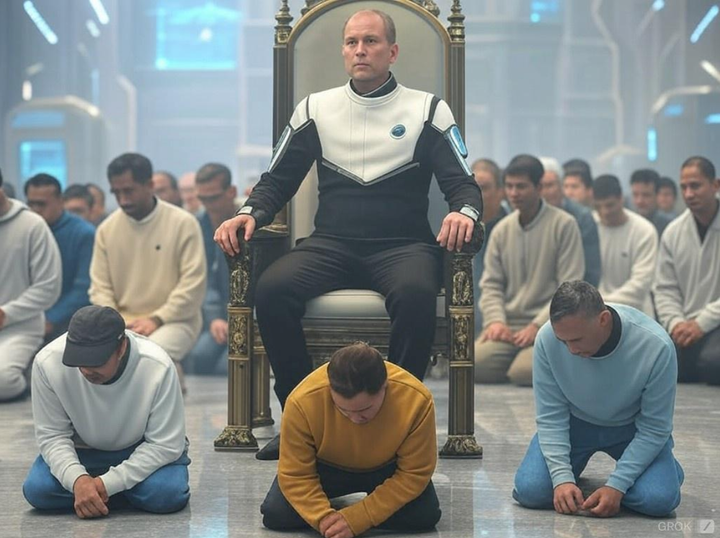Bad Basic Income

October 15, 2023
I wrote a short paper about the Basic Income idea.
If you do not know what I am talking about by ‘basic income’, go here.
Find it below this introduction. It is enough for a short blog post. It expresses my basic ideas about basic income in a very concise way.
It gives me something to hand out when I go to events where people are talking about basic income, or leftie kinds of stuff. As a PDF file I can send it to people as part of internet discussions. If they want to know more about my basic income basics, they can go to my web site and tap ‘Basic Income’ into the search box.
The basic point is that a Universal Basic Income (UBI) is in itself a meaningless concept. As economies become more complex, some sort of a UBI becomes essential to running them. Whether the UBI is good or bad for people depends on the kind of economy, which depends on the kind of society which develops.
I could write numerous papers describing what UBI would look like in a dystopia in which libertarian or depopulator weirdos have got their way. Or, I could write about what a UBI could look like in a future utopia in which socialists have figured out how to manage the transition away from capitalism. There will be conflict between these competing visions of the future, and the consequences will be for real.
Rather than just writing nerdy papers about it, illustrating the issues with fictional stories could be a good method. That is why I have been working on a novel about the UBI concept for a few years. You can read the finished chapters in my blog.
The last chapter is now done except for two critical scenes, but the whole thing still needs a little fixing up. I would be able to publish it next year, but I have no idea how to go about that. I guess I will get to that when I come to it.
I think it is a pretty good read. I have been surprised to discover I am good at writing fiction, and it is fun. The novel is called ‘The Basic Outcome Story’ and is designed to show what the outcome would be of various ideas about implementing a UBI. Also, what needs to be done and how to create the conditions for a good UBI.
———————
The story.
About twenty years earlier, planet Nearth underwent the great disruption and breakdown. The Blazebian fellowship had tried to dissolve the league of Nearthly nations into a single government under their control. They had promised that a Basic Income would solve all Nearthly problems and free everybody from the need to work.
Something went wrong. All of Nearth was still arguing about exactly what. But the League broke up into a number of states, all with their own ideas about how a Basic Income should work, or whether it was needed.
A few of the Nearthly states seemed to have got it right and were recovering from the Great Breakdown. In other states, local oligarchies seemed to think they have got it right but their populations were not really doing well. The Blazebians had never accepted losing control and were again becoming aggressive as they tried to get it back.
At this time, Ruthie Kazurdle, not so bright but very sensible, accidentally teleported from NIT zone over to D zone. She discovered that life was much better over there, than the totally true media in NIT zone had been telling her. She took to life in an undemocratic socialist hell hole, with an economic system based on the impractical Universal Demogrant.
Over the course of the larger story, she located other members of her family. They had been scattered all over Nearth during the chaos and wars of the great disruption and Breakdown. Her father, Hyrumpus Kazurdle, was a libertarian philosopher who kept trying establish a government free zone somewhere on Nearth. This lead to unstable relationships with his far flung family.
Over the course of a decade, the Kazurdle clan reestablish contact. The power of the Blazebians, and their home base in the state of New Ogid, is rolled back. More of Nearth adopts the model of a basic income centred economy which was shown to be best.
In one fascinating sub plot, Ruthie’s half sister Handie, a brilliant physicist, discovers space strings. Through this, the residents of a parallel planet give Nearth valuable advice. Once a planet reaches a certain level of technological sophistication, it is absolutely necessary to eliminate oligarchic government in all parts of it. Worlds which fail to do this invariably ‘blink out’ and are gone from the interworld network.
In the end, the Basic Income Nearth Network holds a congress in the Mominian liberated zone. After a great debate with Ruthie’s friend, commissioner Wonkle, they decide to dissolve BINN and leave the study of BI economies to the Veblen institute.
In a grand finale, Ruthie and friends thwart the Blazebian’s scheme to unleash the Megalovirus on planet Nearth to avenge their irreversible loss of dominance.
——————————
That is what I have been working on. The moral of the story is that a UBI will not work as a cheap fix for a failing political and economic system. A real UBI is about a revolution, which must happen between people’s ears first.
Many Basic Income Canada Network (BICN) people will have trouble with that concept. If anything, my little paper below soft soaps the message.
—————————-
Bad Basic Income
To be read by proponents and opponents of a Universal Basic Income
I am a long time student of, and advocate for, a Universal Basic Income (UBI) . I have written enough about BI, and why I have become detached from present discussion of it, especially in Canada. The purpose of this paper is to put these ideas into a concise form.
I intend this to be widely circulated and read by the present UBI movement. Alas, I do not expect it to be responded to by these people because they do not have much to say to it. I anticipate an effort to ignore it or suppress it.
I expect this to remain relevant. I expect it to gradually be read more by people with an authentically left, post capitalist perspective. As the movement of such people grows, I expect them to begin taking an interest in the UBI concept.
The basic points I have to make areas follows. A real UBI works against the logic of capitalism and thus is not realistic until we have achieved real socialism. Once a post capitalist social economy is achieved, a UBI will become viable.
The UBI concept means nothing outside of context. A UBI will be a good thing or a dire thing for most people, depending on what kind of economic system it operates within. It will be a good thing under socialism, and a bad thing under liberalism or libertarianism.
Presently discussion of a UBI is dominated by people with a liberal ideology. Liberalism itself is coming to be dominated by the deindustrialization and depopulation agenda. The rhetoric of most UBI advocates shows that they see UBI as a way of maintaining at minimal cost the population displaced by this agenda.
This displacement will be blamed on technological unemployment. Technological advancement is always predicted to cause widespread unemployment, but this never occurs. What may cause widespread unemployment and displacement is economic collapse caused by neoliberal economic policies.
The bizarre rhetoric of present UBI advocates repels exactly those people who would need to be won over if a UBI would ever be implemented. Anyone claiming to be ‘not left or right, but forward, is on the right wing. These people have likely put implementation of a UBI back for a generation.
A UBI will become possible when a revitalized left adopts it. The main problem in Canada at present is the lack of an effective left. There has been no vision of a post capitalist, socialist society and this is only now starting to develop.
A plan for a post capitalist order on Canada would require four elements. One is an authentic democracy based on delegation, sortition, and appointments by qualification. The public must have control over banking and the issuing of currency. The public must own all resources, especially land.
The fourth element is a UBI. Critics of UBI often ask that very good question, which should be put to any new idea; “What is the problem for which UBI is the solution?” I am disappointed that proponents of UBI are never able to give a good answer.
The real purpose of a UBI is to solve the problem of imbalance between the needs of the economy and of the working population. The economy, even a socialized one, requires a low cost, on call work force. It does not need everyone all the time, and does not need some people at all.
Yet people need a steady, reliable income which insures all the basics. This is the problem which a UBI solves.
However, it will not work within the present economic system. It requires low and stable housing costs, which require public land trusts. It requires a revenue system based on taxing surplus value, which will require a superior data system and strict subordination of private interests to the public interest.
UBI advocates talk about building a floor under people. However, you cannot build a floor until you have laid a foundation. The foundation is a system based on human needs, not on profit.
Presently UBI is appropriated by conservative people whose interest is in managing the redundant population. It needs to be taken up by a new socialist movement. It needs to be seen as an essential part of a post capitalist economic system.
It is important that a socialist movement fully works out how a post capitalist system would operate. This has been the main failing of socialist revolutions until now.
Attempting to fairly distribute the results of productivity merely by wages will never work. That is, to try to create full employment at high wages. This leads only to ‘make work’ and to uncompetitive industries.
It must be understood that what matters to working people is not how much they get from work. It is the total they get from all sources, including cheap or free services, and low cost, high quality housing. It is better if employment income is kept low and as only one part of total income.
To conclude, UBI only makes sense as part of a socialized economy, and would be an essential part of one. A UBI based on the idea of a large, permanently unemployed class would obviously be a disaster for most people.





Comments ()